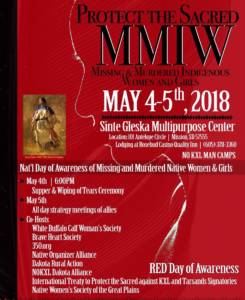If Keystone XL is constructed, three man camps would be built near treaty and unceded territory of the Yankton Sioux, Rosebud Sioux and Cheyenne River Sioux tribes. As we’ve witnessed, fossil fuel development is a direct attack on the water and physical safety of our daughters and women.
 That’s why today and tomorrow, in honor of National Day of Awareness for Missing and Murdered Native Women and Girls, we’re convening in ceremony and solidarity at the Rosebud Sioux Nation – just miles away from where one of the Keystone XL man camps would be erected. We’ll gather to honor and remember our missing and murdered relatives and to say no to this pipeline that will violate our waters, our lands and our women.
That’s why today and tomorrow, in honor of National Day of Awareness for Missing and Murdered Native Women and Girls, we’re convening in ceremony and solidarity at the Rosebud Sioux Nation – just miles away from where one of the Keystone XL man camps would be erected. We’ll gather to honor and remember our missing and murdered relatives and to say no to this pipeline that will violate our waters, our lands and our women.
There is a growing epidemic of Indigenous women who have gone missing or been murdered inflicting great harm on Indigenous communities across North America. Yet state and federal governments have dedicated scant resources to understanding the scale and scope of this grave injustice or how to stop it. The grisly toll of mothers, aunts, sisters and daughters continues.
We won’t let this be ignored any longer. At tomorrow’s gathering we’ll shed a light on the long overdue conversation about missing women, gender violence, and the dangerous relationship between the fossil fuel industry and Indigenous communities. We hope you’ll join us.
When the fossil fuel industry builds pipelines, they bring raucous camps full of young and rowdy men. These “man camps” endanger our communities increasing the rate of violence against women. This is one overlooked, but fundamental way the fossil fuel industry attacks our Indigenous peoples, communities and ways of life.
It is important for all to be brave enough to stand against this as the rate of violence on all women is on the rise and the potential for that is legitimized by eminent domain takings of land in our frontline communities. We give thanks to relations far and wide who have signed the Promise to Protect — and hope you will learn more about the threat Keystone XL poses to Indigenous women.
